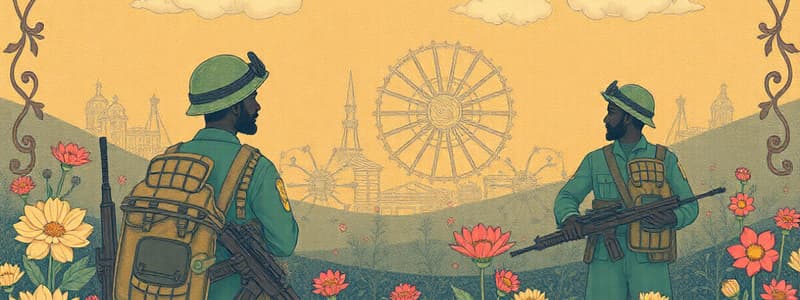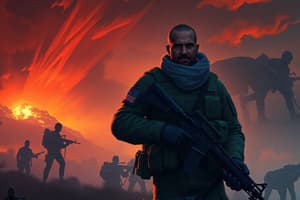Podcast
Questions and Answers
What was the primary reason for the slow repatriation of foreign combatants by MONUC?
What was the primary reason for the slow repatriation of foreign combatants by MONUC?
- The refusal of MONUC to use force. (correct)
- The high rate of violence in the DRC.
- The lack of interest from the Rwandan government.
- The logistical challenges faced during operations.
What are the two major problems that hampered effective peacekeeping in the Democratic Republic of Congo?
What are the two major problems that hampered effective peacekeeping in the Democratic Republic of Congo?
- Lack of funding and personnel shortages
- Inadequate logistical support and lack of political will
- Issues with robust peacekeeping and failure to adapt to conflict (correct)
- Interference from neighboring countries and poor training
Which group was specifically mentioned as a threat due to its ties with the Rwandan genocide?
Which group was specifically mentioned as a threat due to its ties with the Rwandan genocide?
- United Nations Peacekeepers
- Rebels from Uganda
- Forces Démocratiques pour la Libération du Rwanda (FDLR) (correct)
- Forces Armées de la République Démocratique du Congo (FARDC)
What indicators were used to assess the performance of the UN peacekeeping mission in the Democratic Republic of Congo?
What indicators were used to assess the performance of the UN peacekeeping mission in the Democratic Republic of Congo?
What does the term 'DDR' in the context of MONUC's mission relate to?
What does the term 'DDR' in the context of MONUC's mission relate to?
What significant event in 2006 was seen as a political achievement for the Democratic Republic of Congo?
What significant event in 2006 was seen as a political achievement for the Democratic Republic of Congo?
What was a significant challenge MONUC faced when repatriating FDLR members?
What was a significant challenge MONUC faced when repatriating FDLR members?
What was the overall goal of every peacekeeping mission according to the yard-stick mentioned?
What was the overall goal of every peacekeeping mission according to the yard-stick mentioned?
How many lives were estimated to have been lost during the prolonged violence in the Democratic Republic of Congo?
How many lives were estimated to have been lost during the prolonged violence in the Democratic Republic of Congo?
What misunderstanding contributed to the flawed peacekeeping efforts in the Democratic Republic of Congo?
What misunderstanding contributed to the flawed peacekeeping efforts in the Democratic Republic of Congo?
What was the primary method used to assess the reduction of human suffering by MONUC?
What was the primary method used to assess the reduction of human suffering by MONUC?
What significant event caused the initial rise in internally displaced persons in 2003?
What significant event caused the initial rise in internally displaced persons in 2003?
When did the number of internally displaced persons begin to noticeably decline?
When did the number of internally displaced persons begin to noticeably decline?
What led to the paradoxical increase in internally displaced persons after the Pretoria peace agreement?
What led to the paradoxical increase in internally displaced persons after the Pretoria peace agreement?
What challenge does assessing large-scale violence present in regions like the DRC?
What challenge does assessing large-scale violence present in regions like the DRC?
Flashcards
Robust peacekeeping
Robust peacekeeping
A type of peacekeeping operation that employs military force to protect civilians and enforce peace agreements.
MONUC
MONUC
The United Nations peacekeeping mission in the Democratic Republic of Congo (DRC) was criticized for its lack of effectiveness.
Adapting to a dynamic conflict environment
Adapting to a dynamic conflict environment
The process of adapting to changes in the conflict environment, including evolving strategies and tactics.
Benefits of 'post-conflict' elections
Benefits of 'post-conflict' elections
Signup and view all the flashcards
Dynamic conflict environment
Dynamic conflict environment
Signup and view all the flashcards
IDP as a proxy for human suffering
IDP as a proxy for human suffering
Signup and view all the flashcards
Security vacuum after troop withdrawal
Security vacuum after troop withdrawal
Signup and view all the flashcards
Paradoxical increase in IDPs after peace agreement
Paradoxical increase in IDPs after peace agreement
Signup and view all the flashcards
Uneven security in the DRC
Uneven security in the DRC
Signup and view all the flashcards
Challenges in reducing human suffering
Challenges in reducing human suffering
Signup and view all the flashcards
Yardsticks for Peacekeeping Success
Yardsticks for Peacekeeping Success
Signup and view all the flashcards
Foreign Combatants in DRC
Foreign Combatants in DRC
Signup and view all the flashcards
Challenges in Repatriating Foreign Combatants
Challenges in Repatriating Foreign Combatants
Signup and view all the flashcards
MONUC's Mandate and Repatriation
MONUC's Mandate and Repatriation
Signup and view all the flashcards
MONUC Success Amid Challenges
MONUC Success Amid Challenges
Signup and view all the flashcards
Study Notes
Peacekeeping in the Democratic Republic of Congo
-
The UN peacekeeping mission in the Democratic Republic of Congo (MONUC) has been criticized as one of the least effective peacekeeping forces globally. Its performance is assessed using two key indicators: mandate implementation and the reduction of human suffering.
-
MONUC faced significant challenges with a vague concept of "robust peacekeeping," often trying to implement peacekeeping measures when force was necessary, and failing to adapt to the dynamic conflict environment and flawed assumptions about the peace process.
-
Violence in the DRC cost the lives of five million Congolese. The elections of 2006 were a major political achievement and represented a step towards peace after decades of conflict.
-
The UN Organization Mission in the DRC (MONUC) has been central to international efforts to achieve peace. Initially a small liaison team, it evolved into a multidimensional peacekeeping mission with a broad mandate.
-
Although a large and expensive mission, criticisms of MONUC are especially strong, and Congolese citizens frequently protested against perceived failings.
-
The article details the four phases of MONUC's deployment, starting with its creation in 1999 and concluding with the 2006 elections.
-
The deployment phases focused on the implementation of ceasefires, troop withdrawals, and DDRRR (disarmament, demobilization, reintegration, resettlement and repatriation) of foreign armed groups.
-
Violence persisted in eastern regions of the DRC despite the establishment of a transitional government. Internally displaced populations (IDPs) remained high, especially in the Kivu provinces and Ituri, posing serious challenges to the peacekeeping operations.
-
Mandate implementation and the reduction of human suffering were the two primary criteria used to assess MONUC's effectiveness.
-
The UN peacekeeping efforts were hampered by various factors including the difficult political environment, conceptual and operational problems with mandate interpretation, and a lack of adaptation to the evolving conflict.
-
The Congo Wars were complex, intertwined conflicts encompassing regional disputes and domestic struggles. The conflicts were further complicated by the presence of foreign armed groups.
-
MONUC struggled to effectively protect civilians and deter violence. The high number of internally displaced people (IDPs) despite troop increases, highlights a failure of the mission to adequately address the core issues affecting the population.
-
The article concludes that MONUC's performance was complex and mixed, marked by both positive achievements and significant failings, especially regarding civilian protection and the establishment of durable peace.
Studying That Suits You
Use AI to generate personalized quizzes and flashcards to suit your learning preferences.



